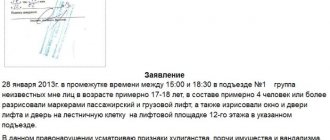Concept of criminal liability
Criminal liability is one of the types of legal liability, along with administrative, civil, and disciplinary liability. It also acts as one of the measures of state coercion. The Criminal Code of the Russian Federation does not disclose the concept and content of responsibility, which allows scientists to form a scientific debate on these issues, expressing different points of view. Analyzing the latter, the concept of criminal liability can be formulated as follows.
Criminal liability is the obligation of a person who has committed a crime to undergo measures of influence provided for by criminal and criminal procedural legislation, consisting of deprivations of a personal or property nature, expressing a negative assessment of the committed act and the culprit himself, and with the goals of restoring social justice, correcting the culprit, and also preventing the commission of new crimes by both them and other persons.
The concept of criminal liability is used by the legislator in various articles of the Criminal Code of the Russian Federation. In particular, Part 1 of Art. 1 of the Criminal Code of the Russian Federation; Part 2 Art. 2 of the Criminal Code of the Russian Federation; Art. 5 of the Criminal Code of the Russian Federation; section 4 is devoted to exemption from criminal liability and punishment; section 5 – criminal liability of minors.
Separate norms are contained in Art. 8 of the Criminal Code of the Russian Federation “Grounds of criminal liability” and Art. 19 of the Criminal Code of the Russian Federation “General conditions of criminal liability”.
In the norms of the Special Part of the Criminal Code of the Russian Federation, the legislator established responsibility for socially dangerous acts recognized as crimes, and it also stipulates the types and amounts of punishment for their commission. The presence of such norms, contained in the Special Part of the Criminal Code of the Russian Federation, characterizes criminal liability as preventive. In the theory of criminal law, it is called positive responsibility. It informs citizens under what conditions, if a crime is committed, government measures will be applied.
The implementation of the retrospective (negative) aspect of criminal liability begins from the moment a specific criminal legal relationship appears, arising from the moment a person commits a crime. It is obliged to be subject to government measures, and at the same time has the right to protection. The state, represented by law enforcement agencies, can apply to a person who has committed a crime the measures provided for by criminal law and ensure the right to protection of this person. That is, mutual rights and obligations arise between the person who committed the crime and the state.
In practice, the obligation of a person who has committed a crime to undergo measures of state legal coercion may not always be implemented. For example, when the culprit hides from the investigation and trial, or the crime is not solved under other circumstances. Therefore, the person who committed the crime is not always punished.
Criminal liability is much broader in its scope of punishment. In some cases, the Criminal Code of the Russian Federation provides for criminal liability without imposing punishment. So, for example, in Art. 92 of the Criminal Code of the Russian Federation establishes a provision according to which a minor who has committed a crime of minor or moderate gravity can be released from punishment by applying compulsory educational measures to him.
Criminal liability comes before punishment. From the point of view of the positive aspect, its appearance is the moment the criminal law comes into force, that is, the moment the threat of criminal prosecution of the person who committed the crime arises.
From the point of view of the retrospective aspect, criminal liability arises when a crime is committed and a criminal legal relationship arises. In this regard, rights and obligations arise between the state and the person who committed the crime.
Bringing a person to criminal liability is the next stage of its implementation. Criminal procedural measures are applied to the person who committed the crime; In the committed act, the elements of a crime are established. Next comes the stage of execution of punishment. Criminal liability remains for the entire period of the criminal record until it is withdrawn or expunged, or until an amnesty or pardon is applied.
Criminal liability has the following characteristics.
1. Criminal liability arises only for the commission of a crime (Article 8 of the Criminal Code of the Russian Federation). Acts committed by persons who have not reached the age established by criminal law (Article 20 of the Criminal Code of the Russian Federation) and are insane (Article 21 of the Criminal Code of the Russian Federation), minor acts (Part 2) are not crimes, and, therefore, cannot act as a basis for criminal liability Article 14 of the Criminal Code of the Russian Federation), as well as acts that are not crimes, committed in conditions of necessary defense (Article 37 of the Criminal Code of the Russian Federation), extreme necessity (Article 39 of the Criminal Code of the Russian Federation), justified risk (Article 41 of the Criminal Code of the Russian Federation).
2. Criminal liability is a measure of state coercion provided for by criminal law, imposed only by the court and implemented with the participation of authorized state bodies.
3. Criminal liability is accompanied by an official state conviction of the person who committed the crime. When a conviction is made, the court, on behalf of the state, condemns the offender, recognizes the crime committed, and declares the person who committed the crime to be a criminal.
4. The content of criminal liability lies in the negative legal consequences for the person who committed the crime, who must undergo deprivation or limitation of his rights to the extent provided for by criminal law.
The scope of deprivation (restriction) of rights, which consists of criminal liability, is the largest (up to life imprisonment) in contrast to all other types of legal liability.
5. Criminal liability is implemented in a special procedural form. The activities of law enforcement agencies and the court to establish a person’s guilt are regulated by the criminal procedure law (Code of Criminal Procedure of the Russian Federation). Execution of criminal penalties is carried out in accordance with the articles of the Criminal Executive Code (hereinafter referred to as the Penal Code of the Russian Federation). Thus, criminal procedural and criminal executive legislation ensure the implementation of criminal liability.
6. Criminal liability is strictly personal in nature, that is, it is assigned only to the person guilty of committing a crime, only to a sane individual who has reached the age established by criminal law (Article 19 of the Criminal Code of the Russian Federation).
In domestic legal science, the concept of criminal liability is interpreted differently. In general, there are the following main points of view on this issue.
1. Criminal liability is the legal obligation of the person who committed the crime to suffer the adverse consequences provided for by the sanction of the criminal law.
2. Criminal liability is a consequence of committing a crime, and it arises only from the moment a person is convicted by a court and a guilty verdict is passed (N.F. Kuznetsova, N.A. Ogurtsov, Yu.M. Tkachevsky, V.G. Smirnov, A.V. Kladkov, etc.).
3. Criminal liability is determined through the legal status of the person who committed the crime; is identified with a criminal legal relationship or is determined through a set of criminal legal, procedural and executive relations (A.E. Natashev, A.I. Martsev, Yu.B. Melnikova, etc.).
4. Criminal liability is criminal punishment, the application of sanctions (O.E. Leist).
The disagreements between the first two points of view are associated with the moment of the emergence of criminal legal relations. They contain three elements: subject, content and object. The subjects of criminal law relations are the person who committed the crime, on the one hand, and the competent authorities of the state (inquiry, preliminary investigation, prosecutor's office and court) on the other. The object of a criminal legal relationship is the very fact of committing a crime, and the content is an interconnected set of rights and obligations of both parties to the legal relationship. Since criminal liability is an integral part of the content of law enforcement, the moment of its occurrence is quite legitimately associated with the moment of the emergence of a criminal legal relationship.
Criminal legal relations and criminal liability actually arise from the moment a crime is committed, even if the person who committed it is unknown. Since from this moment the norms of the Criminal Code of the Russian Federation on the expiration of the statute of limitations for bringing to criminal liability (Article 78 of the Criminal Code of the Russian Federation), on the operation of the criminal law in time (Articles 9–10 of the Criminal Code of the Russian Federation) begin to apply.
The criminal procedure law gives reason to believe that criminal legal relations arise from the moment the crime is committed. Thus, a criminal case is initiated upon the commission of a crime. A criminal legal relationship cannot exist without all its necessary elements, i.e. there is a subject, an object, and content. Therefore, the first point of view from these positions seems to be the most correct. Thus, criminal liability arises from the moment the crime is committed.
The third point of view about the concept of “criminal liability” reflects the procedural meaning. Indeed, criminal procedural liability arises from the moment a person is brought in as an accused, when he can be subjected to criminal procedural coercive measures: for example, if one of the preventive measures can be chosen.
At the same time, to impose criminal procedural liability, only probabilistic knowledge of a person’s guilt is sufficient. Thus, the investigator has the right to bring charges only if there is sufficient, but not exhaustive, evidence that gives grounds for bringing charges against the person. That is, criminal procedural liability is possible in relation to a person who may subsequently be found innocent, but criminal liability for such a person is impossible.
Thus, criminal liability arises before the start of the criminal process and, as a rule, continues after its completion.
In cases established by criminal law, criminal liability for the crime committed is terminated in the following cases:
1) in connection with the entry into force of a new criminal law that eliminates the criminality of the act;
2) in connection with exemption from criminal liability and punishment (Articles 75–85 of the Criminal Code of the Russian Federation);
3) in connection with serving a sentence, expunging or expunging a criminal record (Article 86 of the Criminal Code of the Russian Federation).
Thus, criminal liability is the obligation of the person who committed the crime to personally undergo measures of state coercion, consisting of deprivations of a personal, property, and moral nature, which express a negative attitude towards the crime committed by the state and society.
This obligation arises from the moment the crime is committed, is implemented during the preliminary investigation, when a court pronounces a sentence, while serving a sentence, during the period of an outstanding or unexpunged conviction, and is terminated in the manner prescribed by law.
The concept of criminal liability is closely related to the concepts of “punishment” and “conviction”.
Criminal liability is realized in the process of serving a sentence, but it is also possible without imposing a punishment. In such cases, the court makes a guilty verdict, but does not impose criminal punishment. For example, when minors are released from punishment (Article 92 of the Criminal Code of the Russian Federation).
In addition, criminal liability and punishment do not coincide in time. Criminal liability arises and begins to be implemented from the moment the crime is committed until the sentencing is imposed by the court, and continues in all cases even after serving the sentence in the form of a criminal record. A criminal record is a special legal status of a person, implying restrictions and deprivations of a legal and moral nature. A criminal record continues after serving a sentence for a more or less long period of time in accordance with the provisions of the Criminal Code of the Russian Federation.
Thus, criminal liability in all cases is broader than the concepts of “punishment” and “conviction”. It is possible without imposing a punishment and, therefore, without a criminal record, but punishment and a criminal record without criminal liability are impossible.
Qualification of crimes
Crimes are classified according to three bases:
1) the degree of public danger;
2) the structure of the crime;
3) designs of the objective side.
According to the degree of public danger they distinguish:
- main element of the crime;
- privileged composition: with mitigating circumstances;
- qualified personnel: with aggravating circumstances.
For example, Article 161 of the Criminal Code (robbery):
-1 part: open theft of property (robbery) without specifying any additional characteristics (basic composition),
- Part 2 and Part 3 contain a number of aggravating features: the commission of an act by a group of persons by prior conspiracy or by an organized group of persons, with illegal entry into a home, with the use of violence not dangerous to life or health, or with the threat of such violence, on a large scale or on an especially large scale (qualified staff).
Examples of privileged composition are Articles 107 of the Criminal Code (murder in a state of passion), 108 of the Criminal Code (murder in excess of necessary defense), 109 of the Criminal Code (causing death by negligence).
Based on their structure, compositions are divided into simple and complex. In simple ones - one object, one form of guilt (for example, theft), in false ones - there may be several objects, several forms of guilt (for example, robbery; violation of industrial safety rules, resulting in the death of a person through negligence).
By design, the compositions are divided into:
- material (the crime is completed at the moment the consequences occur - theft, murder, causing grievous bodily harm),
- formal (the crime is completed at the moment of the described act - hooliganism).




